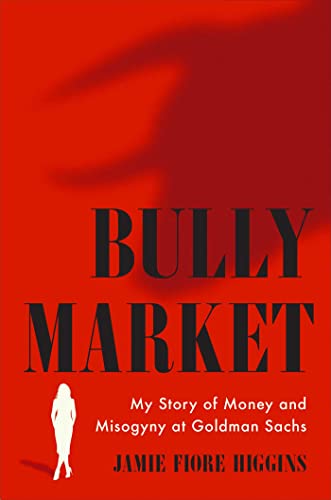Books |
Bully Market: My Story of Money and Misogyny at Goldman Sachs
Jamie Fiore Higgins
By
Published: Aug 29, 2022
Category:
Memoir
A few years ago, I lectured at the Rutgers Writers’ Conference. My topic: Writing Non-Fiction as Fiction. The participants were middle-aged, non-professionals who liked to write. They were pleasant, and their ideas were pleasant, and nothing they were writing would ever bear a commercial imprint.
Except for Jamie Fiore Higgins. She was a former Managing Director at Goldman Sachs, and she had a hair-curling story to tell. Greed was standard, this was Wall Street, no big deal. But the sexism! The misogyny! The gratuitous cruelty! Could she reconstruct two decades of bad behavior? Yes, she could. And could she mother four children while she wrote? No problem. I emailed her to encourage her. She thanked me.
A few months ago, she wrote to say she’d finished the book, and Simon & Schuster had bought it. The manuscript was embargoed, but someone leaked to Bloomberg, and a piece delivered a guided tour of the book. A Goldman spokesperson commented: “We strongly disagree with Ms. Higgins’ characterization of Goldman Sachs’ culture, and we decline to respond to anonymized allegations.” Goldman will presumably maintain professional silence and stand on the words at the top of its web site: “The Goldman Sachs culture values teamwork, client service and giving back to the communities we serve. It has been described as the foundation of the firm’s success.”
Meanwhile, S&S will treat Goldman — the investment bank ranked second in the world by revenue — like a pinata. When was the last time that you saw a book video made by the CEO? Watch Jonathan Karp.
I’ve teased you enough. Meet Jamie Fiore Higgins. Her parents knew education was key to success in America, and sent her to Bryn Mawr. When she graduated, she planned to help people — as a social worker. Her mother vetoed that dream: “We didn’t take out loans to pay $35,000 a year for you to get a $20,000 job.” She didn’t have the clothes, and she didn’t have the slick manners of other aspirants, but she was wicked smart, and suddenly she was grinding all day, attending mandatory group dinners at night, getting home after midnight and waking up at 4 AM for the commute to an ungodly start time at Goldman.
You know the story: she is a work beast, she has total focus, she pulls ahead of the pack. She ascends by building a cadre of clients other colleagues believe are too small to care about. She manages teams. Her record is too strong to be ignored — she becomes a managing director. The book is a record of the cost. [To visit her website, click here. To buy the book from Amazon, click here. For the Kindle edition, click here.]
The richer and more intrenched they get, the more male assholes on Wall Street don’t bother to pretend. Example: Higgins was the team manager who took over from a colleague who was having an affair with a client. She moved him off the account. His response was to wrap his hand on her throat until she almost passed out. Would you report that? HR advised her not to. A few years later, she did report a colleague. HR confidentiality? HR anonymity? Dream on. The boss warned her not to take complaints outside the team. And her role started getting… smaller.
The stories that will especially delight interviewers are about Goldman’s treatment of women — especially women who breed. Goldman has a lactation center. Woe to the woman who visits it; she’s announcing to her colleagues she’s some kind of cow. Higgins became the delighted mother of twins. She needed the lactation center. The first time she used it, there was a carton of milk by her computer when she returned to her desk. The second time, a stuffed cow. Another time, men made “moo” sounds. Her boss was blunt: spend too much time there, you might lose a promotion. She kissed the ring and sinned no more. Later, after a miscarriage, she was pressured to return to the office before her doctors signed off on her health.
Sex and money go together, especially in a male-dominated culture. Her first year, colleagues loudly made an Excel spreadsheet rating the newest female employees. “Let’s throw some quantitative analysis on this,” one said. “Research needs to be done on these ladies. I want tit size, ass shape and leg length…” Fifteen years later, a boss shared his requirements for a new assistant with his team: “Nobody too old, too ugly, too flabby. I want ’em young, high, and tight!”
Anthropology teaches us that we become what we behold. Higgins is candid about her failings here. She humiliates new candidates. She has an affair with a colleague and nearly wrecks her marriage. “I had become a part of the cycle of abuse,” she writes.
It’s company gospel: “You can only leave Goldman once.” Higgins set a date for her resignation and kept it. That ended admiration when people learned where she worked. No more million-dollar checks. But she regained her self-respect. And she wrote a book that will be read by a great many young women contemplating careers on Wall Street, women who will have more than a few questions for their employers. Correction: demands for their employers.


